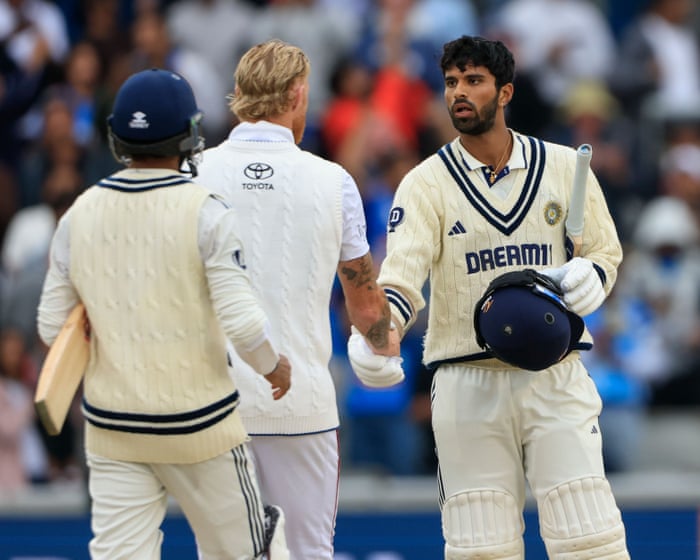Over the past three years, Ben Stokes and Brendon McCullum have instilled a bold, attacking mindset in the England team—an approach that has been refreshing, liberating for the players, and thrilling to watch. While they’ve chosen to prioritize winning and entertaining over playing for draws or personal milestones, that doesn’t mean others share the same philosophy. Centuries still matter to players, and sometimes a draw can be a valuable result.
When India initially declined to accept the draw on Sunday, England’s reaction—a mix of frustration (after dominating the game and wanting to seal the series early), exhaustion, and perhaps a touch of cultural misunderstanding—was understandable. Different cricketing cultures view these situations differently.
Think back to the Jonny Bairstow stumping controversy during the 2023 Ashes or Ravi Ashwin’s non-striker run-out of Jos Buttler in the 2019 IPL. Perspectives on these incidents varied widely between England and other cricketing nations. In county cricket, teams would usually shake hands and walk off, even if batters were nearing centuries—but international cricket is different. Landmarks carry greater weight.
I remember a 2008 County Championship match for Surrey against Somerset at Taunton. The pitch was flat, a day was lost to rain, and with the game drifting toward a draw, I was on 190. As players started shaking hands, Justin Langer, Somerset’s captain at the time, stopped everyone and said, “We’re staying on—either we get Mark out, or he gets a double hundred.” A few minutes later, I reached 200. Langer recognized the significance of the milestone, even for an opposition player.
England do value individual achievements—just look at the celebrations when Joe Root surpassed Ricky Ponting as the second-highest Test run-scorer. Graham Gooch, Alastair Cook, and Jimmy Anderson have all spoken about the pride they took in reaching personal milestones. If a young England batter was on the verge of a maiden Test century, you’d hope their captain would acknowledge that moment—it’s a career-defining achievement that might never come again.
Some of England’s on-field comments didn’t reflect well on them. They played brilliantly and controlled the match, but their frustration overshadowed that. Hopefully, this experience teaches them to respect other teams’ perspectives and the value of a hard-fought draw.
Stokes and McCullum may dismiss draws, but in a tight five-Test series, there will be moments when salvaging a game becomes crucial. I think back to England’s 1998 series against South Africa, where Angus Fraser’s defiant last-over block against Allan Donald secured a morale-boosting draw after being outplayed. That result galvanized us to win the next two Tests and take the series.
Heading into the final Test at The Oval, the series is still alive. The pitches have been flat so far, but traditionally, The Oval offers a bit more for the bowlers with its grassy surface. Gus Atkinson hasn’t played much recently, but he could be a smart pick—his familiarity with the ground might bring extra movement.Here’s a more natural and fluent version of your text:
—
Get our writers’ insights on the biggest stories and a recap of the week’s action.
Sign up with your email address.
Privacy Notice: Our newsletters may include information about charities, online ads, and content funded by external parties. For details, see our Privacy Policy. We use Google reCaptcha for website security, subject to Google’s Privacy Policy and Terms of Service.
—
England face tough bowling decisions as grueling series nears end
England must choose their bowling attack not just on skill but also considering fitness and fatigue. As someone from my generation, I don’t understand why you wouldn’t play a fit player in such a crucial game against top opponents with the series at stake. Resting fully fit players seems odd—yes, they’ve bowled a lot, but there’s a match to win. The big concern is the captain; England can’t afford Stokes breaking down. Their three seamers need to be reliable workhorses.
At Old Trafford, Jofra Archer and Brydon Carse lacked penetration, especially with the new ball and uneven bounce. Liam Dawson was steady but didn’t trouble the batters as much as expected.
Aside from Stokes and Root, Ben Duckett and Zak Crawley stood out. India never recovered from their aggressive start. These openers play high-risk cricket, but once they get going, even the best teams struggle to contain them. Critics focus too much on their failures—we should celebrate their successes too.
—
This version keeps the original meaning while improving flow and readability. Let me know if you’d like any further refinements!



